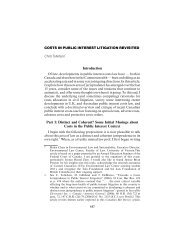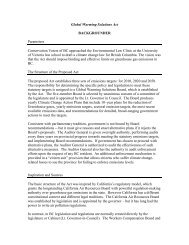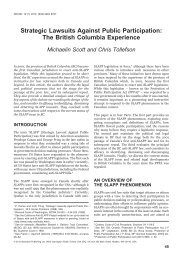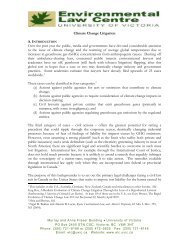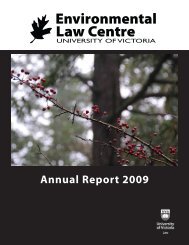Peeling back the Pavement - POLIS Water Sustainability Project
Peeling back the Pavement - POLIS Water Sustainability Project
Peeling back the Pavement - POLIS Water Sustainability Project
Create successful ePaper yourself
Turn your PDF publications into a flip-book with our unique Google optimized e-Paper software.
Principle 3: New Governance:<br />
An Integrated <strong>Water</strong>shed-Based Approach<br />
As <strong>the</strong> United States Environmental Protection Agency<br />
(EPA) has noted, rainwater must be managed on a<br />
watershed scale. 17 <strong>Water</strong>shed governance starts a<br />
cultural shift toward integrated and ecosystem-based<br />
land- and water-use management practices. Some<br />
experts and practitioners in <strong>the</strong> field call this integration “water-centric planning.” 18<br />
Beyond an attitudinal shift, turning ideas into action requires incentives and <strong>the</strong><br />
reorganization of internal local government structures. Collaborative planning must<br />
occur across municipal boundaries and should be supported by <strong>the</strong> introduction<br />
of a formalized coordinating mechanism, such as a Regional <strong>Water</strong> Commission,<br />
<strong>Water</strong>shed Authority, or <strong>Water</strong>shed Agency. This could also be supported<br />
through increased responsibility of and capacity for existing structures, such as<br />
Conservation Authorities or Regional Districts. This formalized entity, whe<strong>the</strong>r<br />
something new or building on an existing body, would have a clear mandate to<br />
ensure watershed health and function, thus enabling it to become a crucial formal<br />
player on land- and water-use decisions that affect <strong>the</strong> surrounding watershed.<br />
Through its coordinating role, such a body would enable municipalities in <strong>the</strong> same<br />
watershed to share <strong>the</strong> costs of implementing rainwater management practices<br />
and measures.<br />
Toge<strong>the</strong>r, <strong>the</strong>se three core concepts—build it better, let rain do <strong>the</strong> work, and new<br />
governance—illustrate <strong>the</strong> character and potential of <strong>the</strong> Rainwater City.<br />
The British Columbia <strong>Water</strong> and Waste<br />
Association (BCWWA) has taken a progressive<br />
stance on stormwater in its Position Statement<br />
on Management of Stormwater:<br />
"In order to protect water quality and <strong>the</strong> public, every community<br />
should adopt an integrated watershed based approach to stormwater<br />
management which emphasizes on-site reduction and retention as<br />
best practice and recognizes <strong>the</strong> need to maintain and enhance existing<br />
infrastructure."<br />
21



